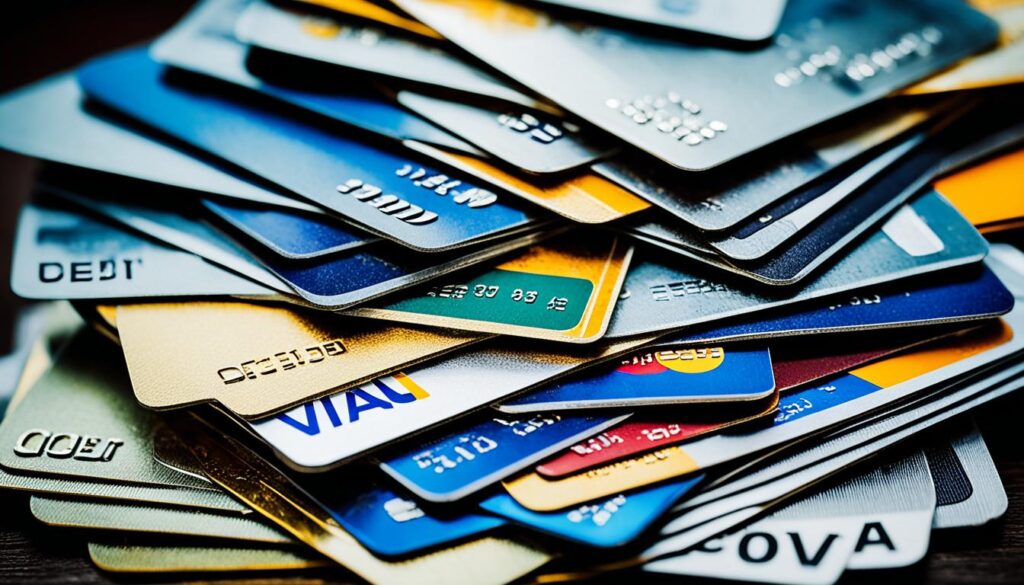In times of crisis, it becomes crucial to navigate your financial behavior effectively. By implementing the right strategies and managing your money wisely, you can enhance your financial resilience and make sound financial decisions. This article will provide you with practical tips and strategies for coping with financial stress, managing your finances during a crisis, and building financial resilience. The information presented in this article is sourced from reputable sources and covers a range of topics, including maximizing your savings, creating a budget, minimizing monthly bills, managing debts, and seeking alternative sources of income.
Key Takeaways:
- Focus on managing your finances wisely during a crisis to enhance your financial resilience.
- Maximize your liquid savings by utilizing cash accounts and short-term government investments.
- Create a budget to understand your financial health and minimize unnecessary expenses.
- Manage your debts effectively and explore additional sources of income to alleviate financial strain.
- Seek support from loved ones and professionals to navigate financial stress and improve your overall well-being.
Maximizing Your Liquid Savings
One of the first steps in navigating financial behavior during a crisis is to maximize your liquid savings. Cash accounts such as checking, savings, and money market accounts, along with short-term government investments, can provide stability and immediate access to funds.
These accounts are not subject to market fluctuations and can be withdrawn without incurring financial losses. It is recommended to have several months’ worth of expenses saved up in liquid savings to guard against unforeseen events. The exact amount will depend on your financial obligations and risk tolerance.
By keeping a well-funded emergency fund in cash accounts, you can be better prepared for any unexpected expenses that arise during challenging market conditions. Liquid savings act as a financial buffer, providing peace of mind and financial flexibility when you need it the most. In the case of a job loss or reduction in income, having a readily available pool of cash can help cover essential expenses and prevent the need to rely on high-interest debt.
It’s crucial to remember that market investments, such as stocks and bonds, may have the potential for higher returns over the long term. However, during a crisis, selling these investments at a loss can exacerbate financial stress. By having liquid savings, you can avoid selling investments at unfavorable market conditions and give yourself time to weather the storm.
Building a robust emergency fund requires discipline and ongoing commitment. Regularly set aside a portion of your income to contribute to your liquid savings. If your current expenses do not allow for substantial savings, look for areas where you can cut back or find ways to increase your income. Consider assessing your budget and identifying unnecessary expenses that can be minimized or eliminated altogether. This will free up extra funds to bolster your liquid savings.
Benefits of Liquid Savings
There are several benefits to having a strong liquid savings portfolio:
- Immediate Access to Funds: Liquid savings provide immediate access to funds without the need to sell assets or incur penalties.
- Financial Security: Having a well-funded emergency fund creates a sense of financial security, allowing you to navigate uncertain times with confidence.
- Protection Against Market Volatility: By allocating a portion of your assets to liquid savings, you hedge against market fluctuations and reduce the risk of detrimental financial outcomes.
- Peace of Mind: Knowing that you have a safety net in the form of liquid savings can alleviate stress and enable you to make more informed financial decisions.
To summarize, maximizing your liquid savings is a fundamental step in effectively managing your financial behavior during a crisis. By maintaining a well-funded emergency fund in cash accounts and short-term government investments, you can mitigate financial risks and ensure immediate access to funds. Furthermore, having liquid savings provides a sense of security, enabling you to navigate market conditions with confidence.
Creating a Budget and Minimizing Monthly Bills
During a crisis, it becomes crucial to create a budget and minimize your monthly bills to effectively manage your expenses and strengthen your financial situation. Budgeting allows you to gain a clear understanding of your financial health and allocate funds properly, while cutting unnecessary expenses helps you reduce financial obligations and increase flexibility in bill payments.
Tracking Income and Allocating Funds
Creating a budget starts with tracking your income and understanding your monthly expenses. This enables you to make informed decisions about how much you can allocate towards various needs and priorities. By having a realistic view of your income and expenses, you can allocate funds in a way that ensures your financial stability during challenging times.
Additionally, consider setting aside a portion of your income as savings to prepare for future emergencies or unforeseen expenses. Building an emergency fund provides a safety net that can cushion the impact of financial crises.
Scrutinizing Monthly Bills
Reducing unnecessary expenses is an essential aspect of managing your monthly bills. Start by reviewing each bill to identify areas where you can cut back or negotiate better rates. This may involve canceling subscriptions or services that you don’t use frequently or finding more cost-effective alternatives.
“Cutting down on unnecessary expenses not only frees up resources but also helps you develop healthier financial habits that can benefit you long-term.”
Here are some practical ways to minimize your monthly bills:
- Switch to free checking accounts or accounts with lower fees.
- Cancel subscriptions that you no longer need or use.
- Explore energy-saving measures to reduce utility bills.
- Consider downgrading your cable or internet plans if you’re not utilizing all the features.
Remember, even small reductions in monthly expenses can add up and make a significant difference in your financial situation.
Regular Bill Management and Timely Payments
Avoiding late fees and finance charges is crucial for minimizing unnecessary expenses. Establish a routine for bill management, ensuring that you diligently review and pay your bills on time. This can be achieved through various methods, such as setting reminders, automating payments, or utilizing budgeting apps that offer bill tracking features.
By having a proactive approach to bill management, you not only save money but also maintain good financial standing. This can positively impact your credit score and increase financial opportunities in the future.
Now that you have a better understanding of how creating a budget and minimizing your monthly bills can enhance your financial stability during a crisis, let’s dive into some practical tips for managing debt and exploring additional income sources in the next sections.

Managing Debt and Exploring Additional Income Sources
During a crisis, effectively managing debt is crucial to alleviate financial stress and build a more stable financial situation. One of the primary areas to focus on is credit card debt. By prioritizing paying down your credit card debt, you can reduce the burden of high-interest rates and fees.
Consider transferring balances from high-interest credit cards to those with lower interest rates through a balance transfer. This strategy can help you save on finance charges and make debt repayment more manageable. However, it’s important to carefully review the terms and conditions of the balance transfer offer to ensure it aligns with your financial goals.
Additionally, exploring additional income sources can provide an opportunity for earning extra cash and improving your financial situation. Here are a few options to consider:
- Selling unneeded possessions: Look for items in your home that you no longer use or need, and consider selling them online or through a garage sale. This can generate some extra income to put towards debt repayment.
- Freelancing: If you have skills or expertise in a particular field, consider freelancing. You can offer your services on freelance platforms and take on projects or assignments that align with your abilities.
- Taking a second job: Taking on a second job, either part-time or on a temporary basis, can also provide an additional income stream. Explore job opportunities in your area or online that can fit with your schedule.
By actively managing your debt and exploring additional income sources, you can make significant progress in improving your financial situation even during challenging times.

How Can Financial Behavior be Managed in Times of Uncertainty and Crisis?
During times of uncertainty and crisis, navigating financial behavior uncertainty can be challenging. It’s important to stay informed, create a budget, and prioritize essential expenses. Seeking professional guidance and avoiding impulsive decisions can help manage financial behavior effectively. Adapting to changing circumstances and staying focused on long-term goals is key.
Conclusion
Financial stress can have severe impacts on mental and physical health, relationships, and overall well-being. It is crucial to prioritize seeking support from loved ones and professionals during times of financial difficulty. Openly discussing your financial concerns can alleviate stress and provide new perspectives on addressing your problems.
One effective strategy for navigating financial behavior in times of crisis is to create a realistic financial plan. By carefully assessing your income, expenses, and financial goals, you can develop a comprehensive plan that aligns with your current circumstances. This can help you make informed decisions, prioritize spending, and work towards long-term financial stability.
In addition to creating a plan, managing debt is essential in reducing financial stress. Prioritizing debt repayment, exploring options like balance transfers to lower interest rates, and seeking professional advice can provide you with strategies to effectively manage your debt and regain control of your financial situation.
While managing your finances, it is also important to explore additional income sources. This could involve taking on a side gig, freelancing, or selling unused possessions. By diversifying your sources of income, you can boost your financial resilience and have more flexibility in times of crisis.
Remember, realistic financial planning, seeking support, and taking proactive steps are key to navigating financial behavior in times of crisis. By prioritizing self-care and seeking the necessary assistance, you can minimize the impact of financial stress on your mental health and overall well-being.
FAQ
How can I navigate my financial behavior effectively during a crisis?
By implementing the right strategies and managing your money wisely, you can enhance your financial resilience and make sound financial decisions. This article will provide you with practical tips and strategies to cope with financial stress, manage your finances during a crisis, and build financial resilience.
What is the importance of maximizing liquid savings during a crisis?
Maximizing your liquid savings, such as cash accounts and short-term government investments, provides stability and immediate access to funds. These accounts are not subject to market fluctuations and can be withdrawn without incurring financial losses, making them indispensable in times of crisis.
How can I create a budget and minimize monthly bills?
Creating a budget allows you to track your income and allocate funds for various needs. By scrutinizing your monthly bills and cutting out unnecessary expenses, you can minimize your financial obligations and have more flexibility in paying your bills. Regular bill management and timely payments will help you avoid late fees and finance charges, reducing unnecessary expenses.
How should I manage debt and explore additional income sources during a crisis?
Prioritize paying down your credit card debt and consider transferring balances to credit cards with lower interest rates to save on finance charges. Exploring additional sources of income, such as selling unneeded possessions, freelancing, or taking a second job, can help alleviate financial strains and create a more stable financial situation.
What steps can I take to navigate financial behavior in times of crisis?
Seek support from loved ones and professionals in times of financial difficulty. Openly discussing your financial concerns can alleviate stress and provide new perspectives on addressing your problems. By creating a realistic financial plan, managing debt, exploring additional income sources, and prioritizing self-care, you can navigate financial behavior in times of crisis more effectively.

